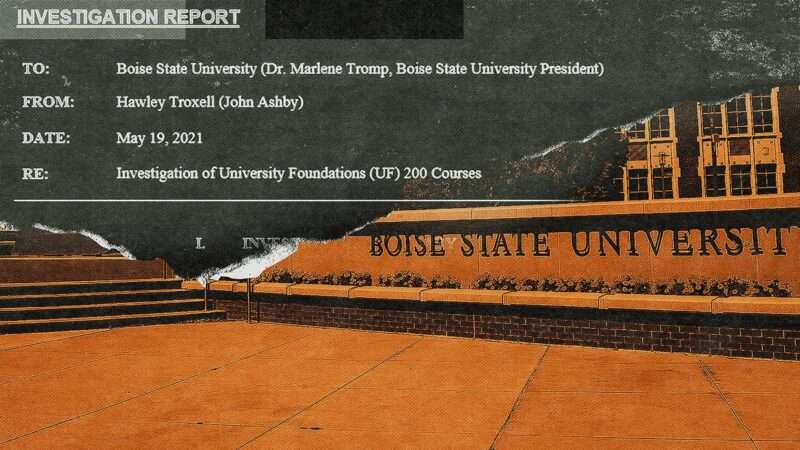
Boise State University canceled 55 classes of diversity-themed ethics courses in March all because of a single complaint that a white student was “mistreated and demeaned” in class. A subsequent independent investigation found no evidence that such an incident ever happened.
At the same time this complaint was filed, though, lawmakers were proposing cutting more than $400,000 from the university’s budget. This budget cut was put forth by Republican lawmakers upset by social justice and critical race theory they believe is taught there. The timing of the anonymous complaint and the drastic action taken by the university, coupled with the lawmakers’ attack on college funding, looks a lot like culture war political combat pitting conservative politicians against progressive academics.
The Foundation for Individual Rights in Education (FIRE) has closely followed the case, concerned that pressure from politicians may be playing a role in what’s acceptable to teach in college and what’s forbidden.
On March 15, an unnamed community leader filed a complaint with the school claiming he had seen a video of a white student in a class being forced to apologize for being white and being taunted by other students for having white privilege. The person who filed the complaint could not direct investigators to this video, nor did they possess a copy of it. Nevertheless, without any proof that this incident happened, the very next day after receiving the complaint, the school canceled all 55 sections of a mandatory course titled University Foundations 200. Nearly 1,300 students were enrolled in the course. Marlene Tromp, the university’s president, told the Idaho Statesman that canceling the classes was a necessary part of investigating the charges. Interim Provost Tony Roark compared it to tracking down a gas leak, saying you had to “evacuate the building” to see if the leak was real.
But Hawley Troxell, the law firm hired by the university, subsequently reported that they “were unable to substantiate the instance of a student being mistreated in a UF 200 course as described by the Complainant.”
They were able to track down one incident that had taken place a week before that might have been mischaracterized: a student in a debate with an instructor over structural inequality and capitalism got upset and called the instructor’s logic “stupid.” A couple of classmates criticized her behavior, and the instructor actually spoke up to defend her. She ended up leaving the Zoom class in tears, but the instructor checked in with her afterward to make sure she was OK. When Hawley Troxell contacted her, she said that the instructor had not treated her disrespectfully. They also found there was no reference to white privilege and no racial taunting.
So Boise State University leaders threw students’ class schedules into disarray all over a single complaint that submitted with no evidence. Aaron Terr at FIRE expresses concern that this response is not based on actual fears that students are being harmed but by fears of political retaliation:
Boise State’s actions look less like a good-faith effort to prevent harassment or discrimination and more like an attempt to appease lawmakers, frustrated by their perception of what was being taught and discussed on campus, on the eve of an upcoming vote that would slash the university’s budget. Additionally, Boise State’s president claims lawmakers had been complaining to her about the UF 200 courses for months. … It seems much more likely that those complaints were about the subject matter of the courses or the “indoctrination” of students, another claim for which Hawley Troxell’s investigation found no evidence.
The college was not rewarded for capitulating to lawmakers. Instead, lawmakers in early May cut a total of $1.5 million from the university’s budget, some of whom have made it abundantly clear that their attack on the college’s funding is connected to Boise State University promoting ideas the lawmakers don’t like. Sen. Carl Crabtree (R–Grangeville) was quoted by the Idaho Statesman saying the cuts would “send a message” to university officials that teaching these subjects would lead to punishment.
In April, between the point that the complaint against Boise State University was filed and the investigation concluded, Idaho lawmakers introduced and passed H.B. 377, which states that “critical race theory” inflames division on the basis of sex, race, ethnicity, religion, color, and nationality. It orders that no public education institution can compel students to affirm or adopt any belief:
- That any sex, race, ethnicity, religion, color, or national origin is inherently superior or inferior;
- That individuals should be adversely treated on the basis of their sex, race, ethnicity, religion, color, or national origin; or
- That individuals, by virtue of sex, race, ethnicity, religion, color, or national origin, are inherently responsible for actions committed in the past by other members of the same sex, race, ethnicity, religion, color, or national origin.
Republican Gov. Brad Little quickly signed this bill into law. The report from Hawley Troxell observes that, had H.B. 377 been in effect when this incident happened, there would have been no violations of its orders.
Even if an incident had happened, it should be unacceptable for lawmakers to use the budget process to punish—or reward—colleges for which ideas are discussed in class at a public university.
from Latest – Reason.com https://ift.tt/3oSWpVr
via IFTTT